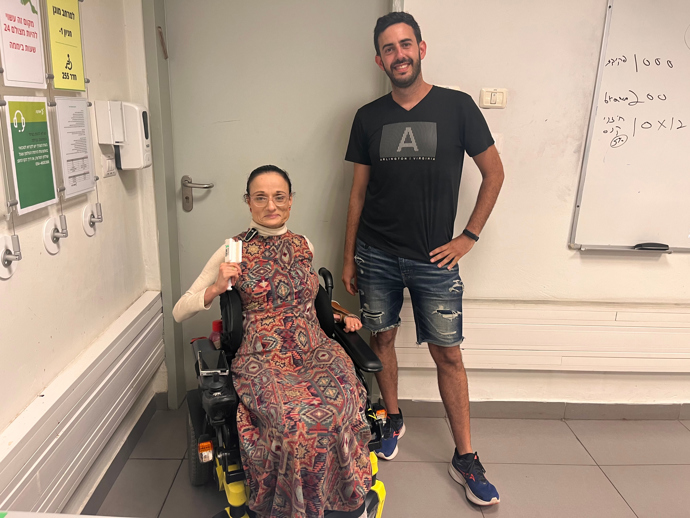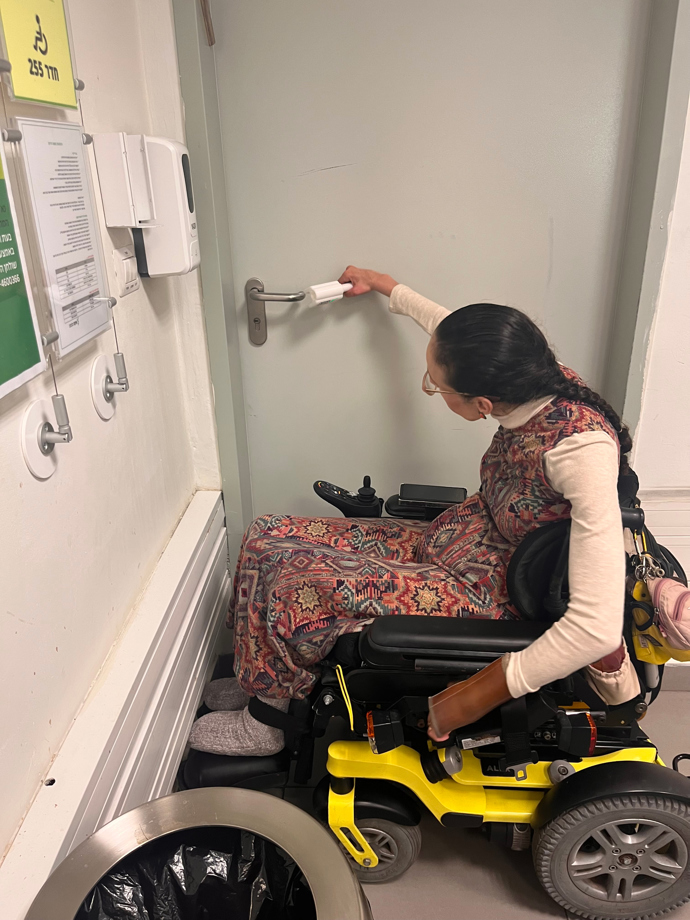

Every day, wheelchair user Osnat faces a frustrating challenge: opening doors. Thanks to an Afeka student, this challenge has been solved, and now Osnat opens doors with ease.
In an empty classroom in an Afeka building bustling with human activity, two people recently met for the first time: Osnat Yehzekel-Lahat (48), a certified service accessibility facilitator and an activist for the rights of people with disabilities, and Asaf Habari (31), a mechanical engineering student and swimming instructor.
Osnat, who uses a wheelchair and has limited limb movement, had requested Asaf’s engineering assistance in solving a challenge she faces daily: opening doors.
Osnat, how did you two meet?
“I happened to see an add by TOM (Tikkun Olam Makers), a project that connects technology, design, engineering, and industry people with social activists and people with disabilities, in order to find innovative solutions for social and community needs. The ad invited people with disabilities to share challenges they’d like to find practical, adapted solutions for. I thought of two challenges that might fit the bill: something to help me brush my teeth, or something to help me open a door.”
Why did you choose the door?
“It’s the first accessibility obstacle I face when I leave the building – opening the door to get out. And it follows me around in the public sphere. Beyond that, I think this kind of development could help not only myself but lots of other people. People tend to think dramatically when it comes to finding solutions for people with disabilities. I understand that opening a door can sound trivial or humdrum, for to me it’s lifechanging.”
Could you share an everyday example where Asaf’s extender was able to help you?
“I recently visited an educational institution to give a talk. My personal care assistant wasn’t with me, and I got there at the very last minute. I found the classroom easily, but unfortunately the door was shut. I simply had no way of getting in. I waited until somebody happened to come out for a bathroom break.”
Asaf, how did you take on this subject?
“As part of a 3D printing course I’m taking for the degree, we had to find a solution for a challenge facing people with disabilities. Afeka’s Center for Innovation and Entrepreneurship initiated a collaboration with TOM, where each month we’ll be presented with the story of a person with disabilities who seeks assistance in finding a solution to ease their situation. That’s when I first heard of Osnat, and naturally my course assignment immediately came to mind.”
Asaf, who in addition to being a student is also a father of two and a swimming instructor, says that the moment he heard about the challenge a solution occurred to him, but worried that he might not have the time for the project.
“In the end, of course I started working on a design for Osnat,” he says.
“I felt I really didn’t have enough information about her needs, so we scheduled a Zoom meeting and spoke at length.”
After their conversation, Asaf began the process of designing and developing a telescopic extender for opening doors.
“The first model was quite bulky and heavy. I improved it by reducing its size. I did the same for the second model, but still wasn’t sure that at the moment of truth it would address Osnat’s need in an optimal way.”
Were you worried about the meeting where she’d test out the design for the first time?
“You could say that. We spoke again the night before the meeting, and she told me that sometimes the simplest things are what works the best. This made me think, and I immediately started planning a fourth design, simple and elegant, which I printed all night to have it on time for the meeting – and indeed this was the model that fit her the best.”
An especially exciting moment at the meeting was when Osant managed to open a door for the first time, and with each attempt the technique became easier for her.
“It’s so simple,” she said after another success. “I just need to be at the right angle.”
The two discussed the design and ways to improve it even further.
“It was fun seeing her smile,” Asaf summed up. “I’m glad that Afeka takes engineering beyond theory and the classroom, and gives us the opportunity to simultaneously apply it and make a difference. This is what drew me to engineering in the first place. The simple solutions that change the world.”
Osnat wished to thank Asaf, Afeka, and TOM for the design, and for considering the community of people with disabilities.
Yael Danai-Menuhin, director of Afeka’s Center for Innovation and Entrepreneurship: “As a leading center for the education of engineers, Afeka places supreme importance on harnessing engineering for the good of mankind. The development of the door-opening telescopic extender for Osnat was the first in a series of future collaborative projects between TOM and Afeka’s students.
We applaud Asaf Habari, who despite his busy schedule found the willingness to take on another person’s challenge and work to help them. This is the spirit of the Center for Innovation and Entrepreneurship and of Afeka in general.”


Afeka opens doors to society
Share a link using:
https://www.afeka.ac.il/en/afeka-news/magazine/afeka-opens-doors-to-society/WhatsApp
Facebook
Twitter
Email
https://www.afeka.ac.il/en/afeka-news/magazine/afeka-opens-doors-to-society/